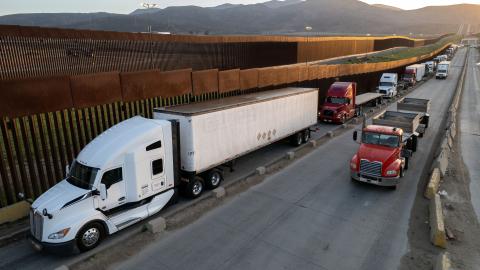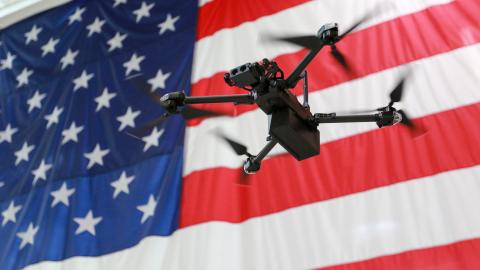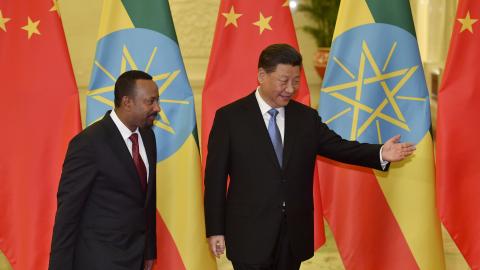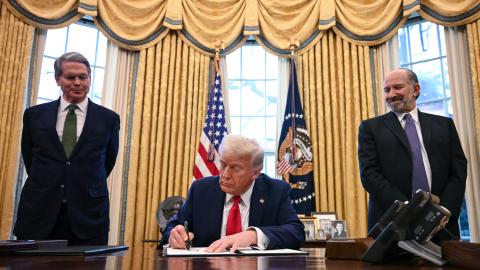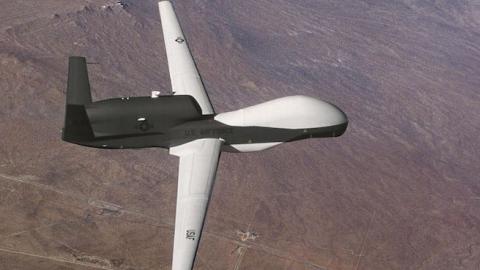Russia’s proxy war on Ukraine is poised to heat up again. Calls for the Obama administration to help arm the outgunned and outmanned Ukrainian military against Russia and its rebel proxies have so far fallen on deaf ears. Yet last month the U.S. government quietly opened a small crack in the arms-export door that Congress — if it’s sufficiently creative, agile, and persistent — can use to help the beleaguered Ukrainians.
Under current U.S. law, military unmanned aerial vehicles or UAVs — widely if wrongly dubbed “drones” — cannot be sold abroad. On February 17, however, the Departments of Commerce, Defense, and State joined together to announce a change in that policy, allowing approval on a case-by-case basis of sales of UAVs of more than 300-kilometer range and 500-kilogram payload to certain foreign nations. This UAV category includes the well-known Predator and Reaper and Northrop Grumman’s Global Hawk.
Ukraine needs to be on the top of that sales list. Despite the UAVs’ fearsome reputation, 95 percent of them actually fly unarmed and perform a vital reconnaissance function. The Ukrainians know that on today’s high-tech battlefield they need state-of-the-art UAVs to help them see and identify their enemies (the ones they are forced to use now date back to the ’70s). The rebels, by contrast, are well stocked by Russia with unmanned reconnaissance systems such as the Orlan 10, which allow the rebels to blast Ukrainian forces with almost pinpoint artillery fire.
The Orlan 10, however, doesn’t begin to compare to the capabilities of the Reaper, the Predator, and the Global Hawk. The Reaper, for example, carries a synthetic-aperture radar or SAR that generates 2D or even 3D images of even fast-moving objects, in both the electro-optical and the infrared spectrums. The Global Hawk, which soars up to 60,000 feet, can carry the same SAR equipment and can also be outfitted with electronic devices to jam enemy air-defense systems.
Even more important, a single Reaper or Predator stays aloft for 27 hours at a time, providing round-the-clock surveillance in any weather and picking out targets at any time of day. That takes away one of the rebels’ key advantages in the current fighting — the element of surprise. By establishing GPS-guided orbits that conform with Ukraine’s borders, operators of the American-made UAVs will be able to see and identify any hostile force from the moment it leaves its base of operations.
This would greatly relieve pressure on Ukraine’s weakened and overstrained air force, as well as its ground forces. It would also buy time for NATO to decide on an appropriate concerted response to any Russian or rebel move. In fact, a Ukrainian fleet of Reapers, Predators, and Global Hawks could be integrated into NATO’s electronic and digital intelligence network. This could not only help to deter Russian moves in Ukraine, but provide some oversight of Russian moves elsewhere in the region.
It’s important to remember that, even if Putin and his allies decide to engage their air-defense systems against these unmanned birds, the UAVs are entirely expendable, with their operators miles away safely on the ground. And “unarmed” doesn’t mean helpless: Although Ukrainian rebels have used electronic jamming effectively against drones sent by the Organization for Security and Cooperation in Europe trying to oversee the fighting, the MQ-3 Reaper can carry the same anti-jamming capabilities that American F-16s and F-18s have. With Global Hawk providing electronic deception of air defenses with its ALE-50 towed decoy array, shooting down these UAVs won’t be as easy as the enemy might think, either.
All this is possible using the unarmed version of these unmanned systems. If the Ukrainians are also supplied with the means to weaponize their Predators and Reapers, which can carry up to 16 Hellfire missiles or four 500-pound bombs, that raises the possibility of precise strikes against the rebels that will make them think twice about coming out of their holes.
So what can Congress do? For now, it can present the president with a bill to authorize the sale of American UAVs to Ukraine, and designate Ukraine as one of the countries eligible under the new policy the government has adopted — while terminating funds for enforcing articles of the Arms Export Control Act that pertain to the sales of UAVs to such countries.
Would President Obama veto a bill that implements the policy his own executive branch has formally endorsed? If he does, he will have made it clear he supports tyranny over democracy in Eastern Europe — and that he prefers Russia to rule the skies over Ukraine.


